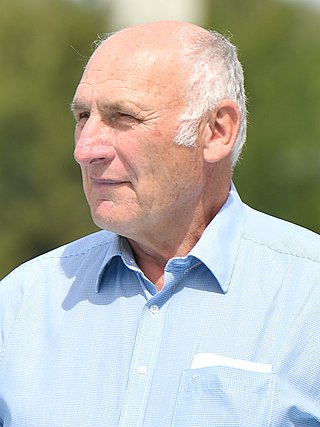
Peter-Michael Kolbe was a German rower who specialized in the single sculls. In this event, between 1975 and 1988 he won five world titles and three Olympic silver medals, in 1976, 1984, and 1988; he missed the 1980 Games because of their boycott by West Germany. His career is known for the rivalry with Pertti Karppinen that stretched for 14 years.

Alf John Hansen is a retired rower from Norway. Early in his career, he received two Norwegian sport awards shared with his brother Frank. Towards the end of his career in 1990, he was the inaugural recipient of the Thomas Keller Medal, the highest honour in rowing. His international rowing career spanned more than two decades.
Jürgen Oelke is a retired German rowing coxswain who had his best achievements in the coxed fours. In this event he won a world title in 1962, a European title in 1963 and a gold medal at the 1964 Summer Olympics.

Igor Aleksandrovich Rudakov is a Russian former coxswain who competed for the Soviet Union in the 1960, 1964, 1968, and in the 1972 Summer Olympics.

Hans-Johann Färber is a German rower who competed for West Germany in the 1968 Summer Olympics, 1972 Summer Olympics and in the 1976 Summer Olympics.
Alois Bierl is a German rower who competed for West Germany in the 1972 Summer Olympics.
Uwe Benter is a German coxswain who competed for West Germany in the 1972 Summer Olympics.
The 1962 World Rowing Championships were the inaugural world championships in rowing. The competition was held in September 1962 on the Rotsee in Lucerne, Switzerland. Rowers from West Germany dominated the competition, winning five of the seven boat classes.

The 1966 World Rowing Championships was the second time that world championships in rowing were held. The regatta was held from 8 to 11 September at Lake Bled in Bled, Slovenia, Yugoslavia. There were 613 rowers from 32 countries who competed in the seven Olympic boat classes. Marketing and advertising for the event were handled by Cesar Lüthi.
The 1970 World Rowing Championships was the 3rd World Rowing Championships. It was held in 1970 at the Royal Canadian Henley Rowing Course in St. Catharines, Ontario, Canada. The competition involved seven events. Prior to the 4th World Rowing Championships in 1974, only men competed.
The 1974 World Rowing Championships was the fourth World Rowing Championships. It was held from 4 to 8 September 1974 and from 29 August to 1 September 1974 on the Rotsee in Lucerne, Switzerland. The event was significantly extended from the 1970 edition, with the addition of both women's and lightweight men's events. Six women boat classes were added, three lightweight men classes, plus quad scull for men, increasing the number of boat classes from seven in 1970 to seventeen in 1974. This was also the last World Championships held on a quadrennial cycle – from this point, World Championships were held annually.
The 1987 World Rowing Championships were World Rowing Championships that were held from 29 to 30 August 1987 in Copenhagen, Denmark while it was "outrageously windy".
The 1992 World Rowing Championships were World Rowing Championships that were held from 13 to 16 August 1992 in Montreal, Quebec, Canada. Since 1992 was an Olympic year for rowing, the World Championships did not include Olympic events scheduled for the 1992 Summer Olympics.

The 1964 European Rowing Championships were rowing championships held on the Bosbaan regatta course in the Dutch capital Amsterdam. Women competed from 31 July to 2 August. Men competed the following week from 6 to 9 August. Men competed in all seven Olympic boat classes, and women entered in five boat classes. Many of the men competed two months later at the Olympic Games in Tokyo; women would first be allowed to compete at Olympic level in 1976.

The 1965 European Rowing Championships were rowing championships held on the Wedau regatta course in the West German city of Duisburg. This edition of the European Rowing Championships was held from 20 to 22 August for women, and from 26 to 29 August for men. Women entered in five boat classes, and 12 countries sent 36 boats. Men competed in all seven Olympic boat classes, and 22 countries sent 89 boats. East German crews did not attend the championships.
The 1963 European Rowing Championships for men were rowing championships held on Lake Bagsværd near the Danish capital Copenhagen; the competition for women was held the following month in Moscow. The regatta in Copenhagen was held from 14 to 18 August.
Stefan Voncken is a German coxswain.
Boris Fyodorov is a Soviet rower. He had a long career, having won international medals between the ages of 22 and 35.
The 1953 European Rowing Championships were rowing championships held on Lake Bagsværd near the Danish capital Copenhagen. Men competed in all seven Olympic boat classes. The regatta was also the third test event for international women's rowing organised by the International Rowing Federation (FISA), with nine countries competing in four boat classes over the shorter race distance of 1,000 m. The purpose of the test event was to see whether women's rowing should formally become part of the FISA-organised European Rowing Championships.
The 1951 European Rowing Championships were rowing championships held on the Mâcon regatta course on the Saône in Mâcon, France. Men competed in all seven Olympic boat classes. The regatta is notable as the first test event for international women's rowing organised by the International Rowing Federation (FISA), with four countries competing in four boat classes over the shorter race distance of 1,000 m. The purpose of the test event was to see whether women's rowing should formally become part of the FISA-organised European Rowing Championships.







